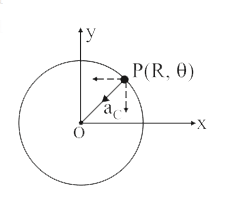For a particle in uniform circular motion , the acceleration →a at a point p(R,θ) on the circle of radiu R is ( Here θ is measured from the x−aξs )
v2Rˆi+v2Rˆj
−v2Rcosθˆi+v2Rsinθˆj
−v2Rsinθˆi+v2Rcosθˆj
−v2Rcosθˆi−v2Rsinθˆj
The correct Answer is:D
Step by step video, text & image solution for For a particle in uniform circular motion , the acceleration vec(a) at a point p ( R, theta ) on the circle of radiu R is ( Here theta is measured from the x- axis ) by Physics experts to help you in doubts & scoring excellent marks in Class 12 exams.
Updated on:21/07/2023Topper's Solved these Questions
- RACEBOOK - ALLENCHAPTER - RACEEXERCISE - Basic Maths (COLLISION AND CENTRE OF MASS )
12 Videos
- RACEBOOK - ALLENCHAPTER - RACEEXERCISE - Basic Maths (ROTATIONAL MOTION)
60 Videos
- RACEBOOK - ALLENCHAPTER - RACEEXERCISE - Basic Maths (WORK POWER & ENERGY)
20 Videos
- NEWTONS LAWS OF MOTIONBOOK - ALLENCHAPTER - NEWTONS LAWS OF MOTIONEXERCISE - EXERCISE-III
28 Videos
- SIMPLE HARMONIC MOTIONBOOK - ALLENCHAPTER - SIMPLE HARMONIC MOTIONEXERCISE - Example
1 Videos
Similar Questions
Knowledge Check
For a particle in uniform circular motion the acceleration →a at a point P(R,θ) on the circle of radius R is : ( here θ is measured from the x- axis )
 A−v2Rcosθˆi+v2RsinθˆjB−v2Rsinθˆi+v2RcosθˆjC−v2Rcosθhai−v2RsinθˆjDv2Rˆi+v2Rˆj
A−v2Rcosθˆi+v2RsinθˆjB−v2Rsinθˆi+v2RcosθˆjC−v2Rcosθhai−v2RsinθˆjDv2Rˆi+v2RˆjFor a particle performing a uniform circular motion the acceleration is
Aconstant in directionBconstant in magnitude but not in directionCconstant in magnitude and directionDconstant neither in magnitude nor in direction.In a non uniform circular motion, the acceleration on the particle is
Acentripetal acceleration onlyBtangential acceleration onlyCthe resultant centripetal and tangential accelerationDcentrifugal acceleration
For a particle in a non-uniform accelerated circular motion
View SolutionThe area of a sector of angle θ∘ of a circle with radius R is
View SolutionA particle undergoes uniform circular motion. About which point on the plane of the circle, will the angular momentum of the particle remain conserved?
View SolutionA particle is moving an a uniform circular motion with radius 'r' Then the distance covered by the particle on one revoution will be
View SolutionA particle is moving in a uniform circular motion with radius'r' in half revolution the displacement and distance covered by the particle are
View Solution
